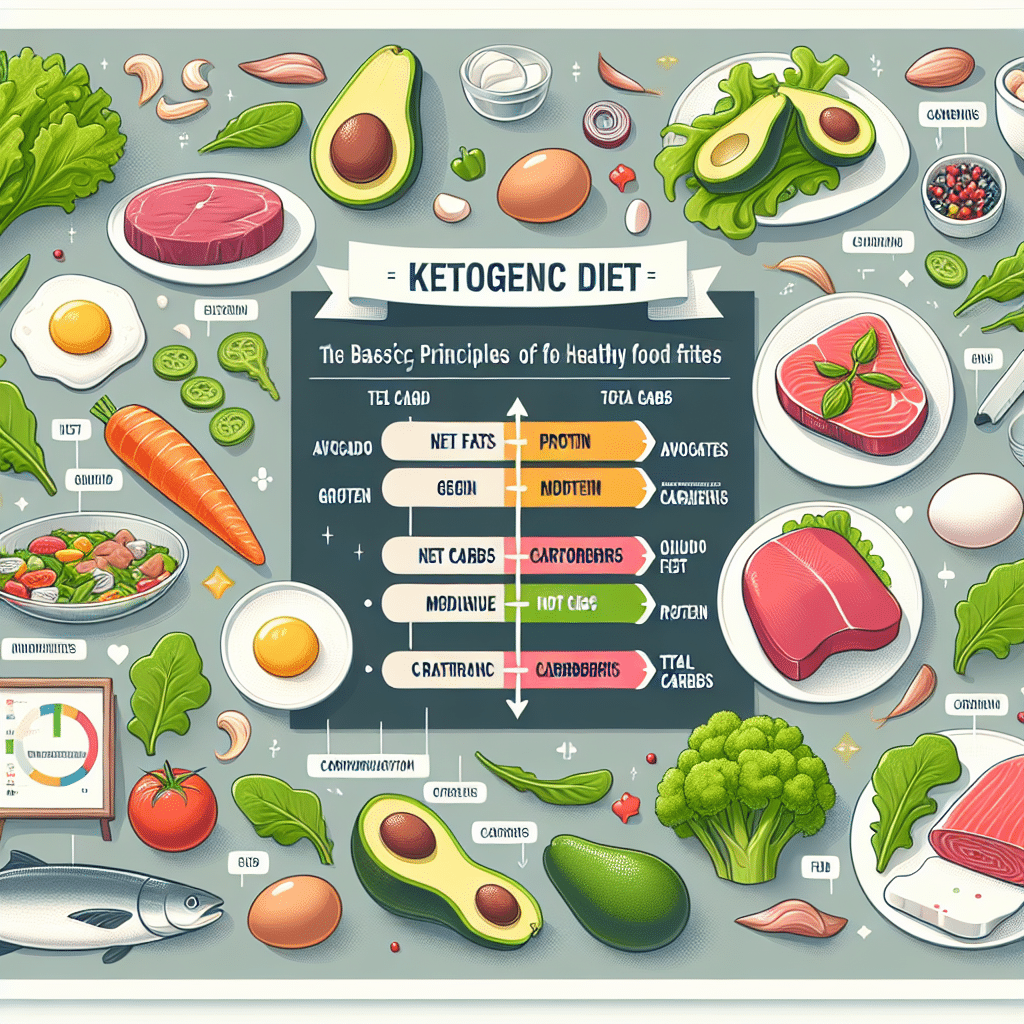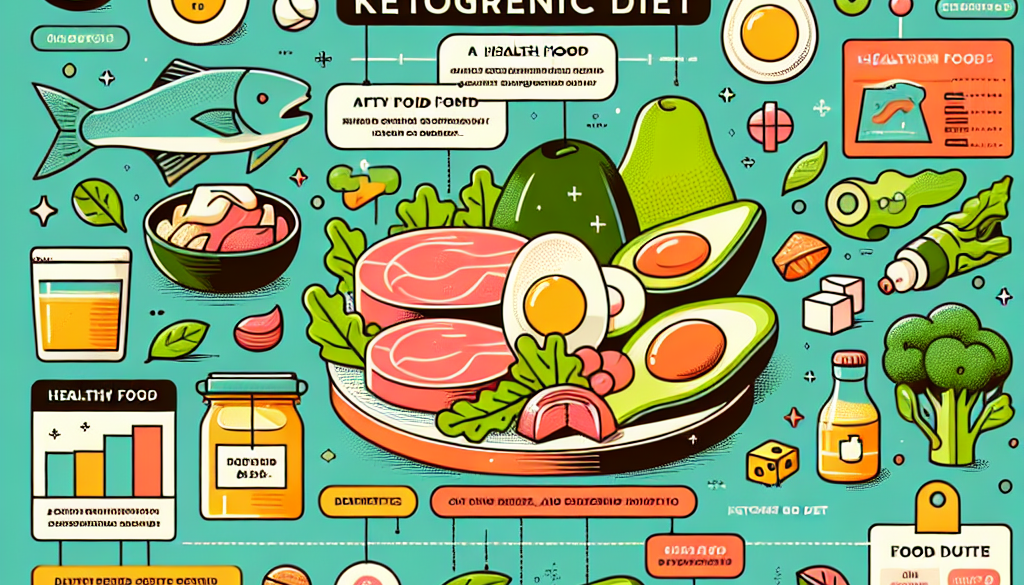The Ketogenic Diet: A Guide to Eating Healthy Sources
-
Table of Contents
- Ketogenic Diet Essentials: Healthy Eating and Nutrient Sources
- Understanding the Ketogenic Diet
- Benefits of a Ketogenic Diet
- Selecting Healthy Fats on Keto
- Protein: Quality Over Quantity
- Carbohydrates: Choosing Low-Glycemic Veggies and Fruits
- Hydration and Electrolytes
- Conclusion: Key Takeaways for a Healthy Ketogenic Diet
- ETprotein: Your Partner in Keto-Friendly Protein Solutions
Ketogenic Diet Essentials: Healthy Eating and Nutrient Sources

The ketogenic diet, or keto for short, has surged in popularity over the past few years, becoming a go-to choice for many looking to improve their health and lose weight. This high-fat, low-carbohydrate diet aims to put the body into a state of ketosis, where it burns fat for fuel instead of carbohydrates. However, navigating the keto landscape can be challenging, especially when it comes to choosing healthy sources of nutrients. In this comprehensive guide, we’ll explore the ketogenic diet’s principles and provide insights into selecting the best foods for a balanced and nutritious keto lifestyle.
Understanding the Ketogenic Diet
The ketogenic diet is based on a nutritional approach that prioritizes fats while minimizing carbohydrate intake. Typically, the macronutrient distribution for a keto diet is around 70-80% fat, 10-20% protein, and 5-10% carbohydrates. By restricting carbs, the body is forced to switch its primary energy source from glucose to ketones, which are produced from the breakdown of fats in the liver.
Benefits of a Ketogenic Diet
Research has shown that the ketogenic diet can offer several health benefits, including:
- Weight loss: Studies suggest that keto can lead to more significant weight loss compared to low-fat diets, partly due to its appetite-suppressing effects.
- Improved blood sugar control: The diet can be beneficial for people with type 2 diabetes or insulin resistance.
- Enhanced brain function: Ketones provide an efficient energy source for the brain and may help with neurological disorders.
- Reduced inflammation: The anti-inflammatory properties of ketones may benefit a range of inflammatory conditions.
Despite these potential benefits, it’s crucial to focus on healthy food sources to ensure the diet remains balanced and nutritious.
Selecting Healthy Fats on Keto
Fats are the cornerstone of the ketogenic diet, but not all fats are created equal. Here’s a breakdown of healthy fats to include:
- Avocados and avocado oil
- Coconut oil and MCT oil
- Extra virgin olive oil
- Grass-fed butter or ghee
- Nuts and seeds like almonds, walnuts, flaxseeds, and chia seeds
- Fatty fish such as salmon, mackerel, and sardines
These fats are not only keto-friendly but also rich in essential nutrients and antioxidants.
Protein: Quality Over Quantity
Protein is an essential macronutrient on keto, but it’s important to not overconsume it, as excess protein can be converted into glucose, potentially taking you out of ketosis. Focus on high-quality protein sources such as:
- Grass-fed meat and pasture-raised poultry
- Wild-caught fish and seafood
- Free-range eggs
- Full-fat dairy products from grass-fed cows
- Plant-based proteins like tempeh and tofu (for vegetarians and vegans)
These protein sources are not only keto-friendly but also provide a range of other health benefits.
Carbohydrates: Choosing Low-Glycemic Veggies and Fruits
While carbs are limited on keto, it’s essential to include nutrient-dense, low-glycemic vegetables and small portions of fruits. These provide fiber, vitamins, and minerals without significantly impacting blood sugar levels. Opt for:
- Leafy greens like spinach, kale, and arugula
- Cruciferous vegetables such as broccoli, cauliflower, and Brussels sprouts
- Bell peppers, zucchini, and asparagus
- Berries like strawberries, raspberries, and blueberries (in moderation)
These choices help maintain a balanced diet and ensure adequate micronutrient intake.
Hydration and Electrolytes
Staying hydrated and maintaining electrolyte balance is crucial on the ketogenic diet. As the body adapts to ketosis, it sheds more water, which can lead to dehydration and loss of electrolytes like sodium, potassium, and magnesium. To combat this, consider:
- Drinking plenty of water throughout the day
- Consuming bone broth or adding salt to foods for sodium
- Eating foods rich in potassium, such as avocados and leafy greens
- Including magnesium-rich foods like nuts, seeds, and dark chocolate
These strategies can help prevent the common side effects associated with the initial stages of ketosis, often referred to as the “keto flu.”
Conclusion: Key Takeaways for a Healthy Ketogenic Diet
The ketogenic diet can offer significant health benefits when done correctly. By focusing on high-quality fats, moderate protein, and low-glycemic vegetables and fruits, you can ensure a nutritious and sustainable approach to keto. Remember to stay hydrated and maintain electrolyte balance to support your body’s transition into and maintenance of ketosis.
For those on a ketogenic diet looking to supplement their protein intake, ETprotein offers a range of organic, non-GMO, allergen-free vegan protein products. Their high-quality proteins, such as organic rice protein and pea protein, are an excellent addition to a keto diet, providing the necessary amino acids without the extra carbohydrates.
ETprotein: Your Partner in Keto-Friendly Protein Solutions
ETprotein’s products are ideal for those following a ketogenic diet who want to ensure they’re getting enough protein while keeping their carb intake in check. Their proteins are not only keto-friendly but also cater to a wide range of dietary preferences and needs. Whether you’re looking for a plant-based protein source or need a high-quality supplement to support your fitness goals, ETprotein has you covered.
About ETprotein:
ETprotein, a reputable protein and L-(+)-Ergothioneine (EGT) Chinese factory manufacturer and supplier, is renowned for producing, stocking, exporting, and delivering the highest quality organic bulk vegan proteins and L-(+)-Ergothioneine. They include Organic rice protein, clear rice protein, pea protein, clear pea protein, watermelon seed protein, pumpkin seed protein, sunflower seed protein, mung bean protein, peanut protein, and L-(+)-Ergothioneine EGT Pharmaceutical grade, L-(+)-Ergothioneine EGT food grade, L-(+)-Ergothioneine EGT cosmetic grade, L-(+)-Ergothioneine EGT reference grade and L-(+)-Ergothioneine EGT standard. Their offerings, characterized by a neutral taste, non-GMO, allergen-free attributes, with L-(+)-Ergothioneine purity over 98%, 99%, cater to a diverse range of industries. They serve nutraceutical, pharmaceutical, cosmeceutical, veterinary, as well as food and beverage finished product distributors, traders, and manufacturers across Europe, USA, Canada, Australia, Thailand, Japan, Korea, Brazil, and Chile, among others.
ETprotein specialization includes exporting and delivering tailor-made protein powder and finished nutritional supplements. Their extensive product range covers sectors like Food and Beverage, Sports Nutrition, Weight Management, Dietary Supplements, Health and Wellness Products, and Infant Formula, ensuring comprehensive solutions to meet all your protein needs.
As a trusted company by leading global food and beverage brands and Fortune 500 companies, ETprotein reinforces China’s reputation in the global arena. For more information or to sample their products, please contact them and email sales(at)ETprotein.com today.














